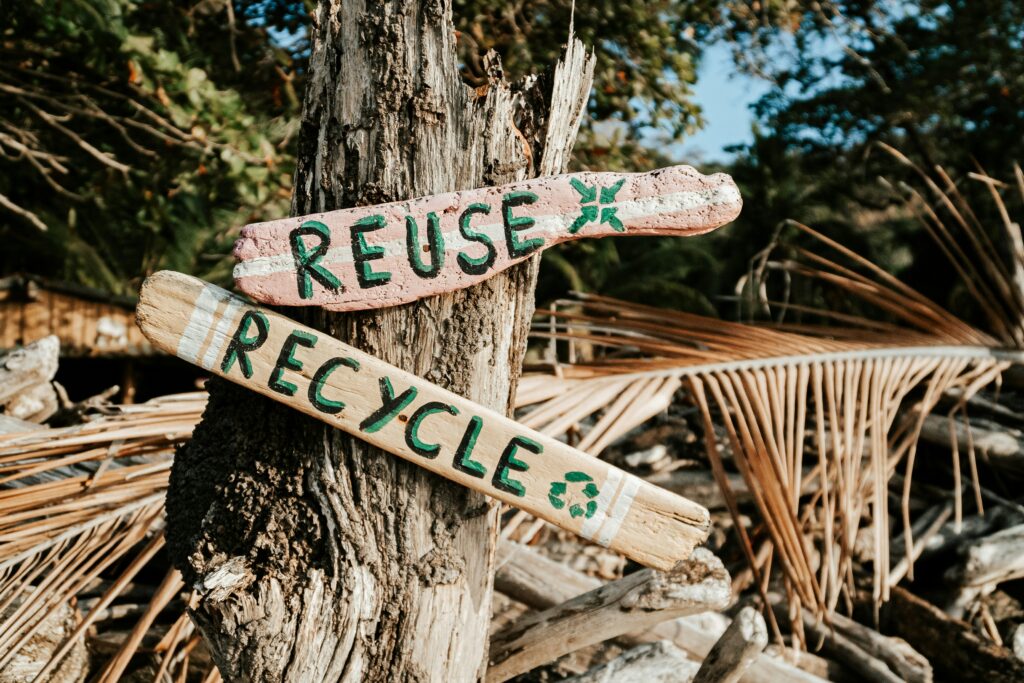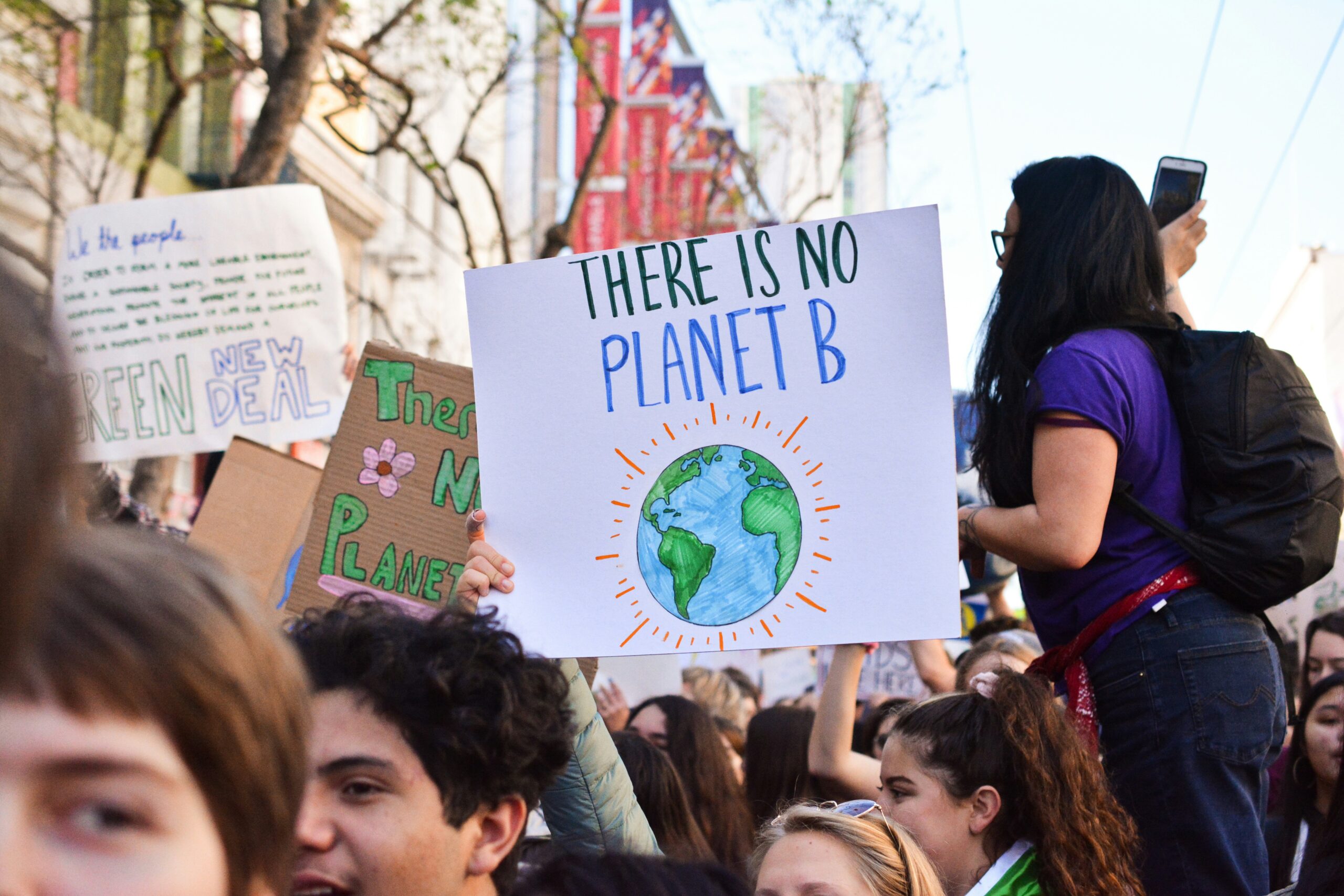How You (and Your Business) Can Be More Waste-Free

At Business For Good, we believe businesses can be as “green” as possible and remain profitable. We’ve previously shared simple tips to make your business more sustainable. Now we explore how to reduce waste through recycling.
First, we must acknowledge a hard truth: consumer-facing enterprises like food services face a continual struggle to do the right thing for our planet. As supply costs continue to rise, so does the price of compostable, recyclable, and organic goods, which are already more expensive to begin with.
To complicate matters, some items we think are the best environmentally friendly choice are actually worse because they’re harder to recycle.
“We’re all intelligent people trying to do the right thing,” says Lila Cleary-Stoner, Business For Good member and co-founder of Allgoods, a 501(c)(3) nonprofit media company focused on creating engaging environmental education. “But it’s still so complicated to know exactly what is and isn’t the best environmental choice when you’re a business owner, because clear information isn’t made readily available most of the time.”
Corey Cleary-Stoner, Lila’s husband and Allgoods co-founder, agrees. “Unfortunately, it’s not as simple as just putting all plastics into the recycling bin. But people want to do the right thing and will do the right thing when it’s the simplest choice.”
That’s where Allgoods steps in. “We’re about making it easier to make the right choice for our planet, with the understanding that we’re not separate from our environment, but interdependent with it,” Corey says.
Sneaky items that seem “green,” but cannot be recycled
Lila and Corey founded Allgoods in 2023 after discovering how little most individuals and business owners knew about environmental stewardship.
They use their experience as actors and co-owners of a production company, Flower + Stone, to create approachable, entertaining content that helps people automatically make the environmentally friendly choice in their homes and businesses.
Here is Lila and Corey’s Recycling 101 information for local businesses—and some great advice for what we can do as consumers.
- Black plastic takeout containers with clear lids. “A lot of people don’t realize how hard these are to recycle,” says Lila. “They’re so common in restaurants, because black plastic is a combination of many different-colored plastics, and therefore the cheapest to make and cheapest to buy. But even if you wash them out and dispose of them properly, black plastic often doesn’t get sorted in recycling facilities, because the sensors can’t detect them, so they’ll end up in the landfill.”
Suggested action: If you tend to have leftovers when you eat out, consider bringing your own container. When you do come across these types of boxes, save and reuse them instead of simply putting them in your blue bin. - Paper receipts. “Clean paper, with no food residue on it, might seem safe to recycle, but receipts aren’t,” says Corey. They’re printed on thermal paper and are full of per-and polyfluoroalkyl substances (PFAs), also known as “forever chemicals,” which take centuries to break down and are therefore not recyclable or compostable.
Suggested action: Whenever possible, request email or text receipts when making purchases. - Paper coffee cups—even the “compostable” ones. “Most to-go coffee cups are lined with plastic, which makes them very hard to recycle even if they’re clean,” says Corey. “If they go to the landfill, they take ages to break down.”But what about “compostable” cups, which are lined with polylactic acid (PLA), a starch-based plastic alternative? “Even these take a much longer time than we think to break down,” says Corey. “Think decades, not months or years, in the landfill. You can really only compost them properly if there’s an industrial composting facility in your municipality that will accept them.”Most to-go paperware, like plates, bowls, cups, and containers are normally compostable. The problem is, they’re often coated with a shiny inner lining made of wax, PLA, or glassine made to reject liquids, which then renders the item non-compostable.
Suggested action: Bring your own reusable travel mug if taking coffee to go or request a “real mug” if sitting down to enjoy it at the coffee shop. You can also invest in a lunchbox with reusable containers and cutlery. - “Compostable” plastic bags. “These are tricky, because it doesn’t just depend on whether your area has an industrial composting facility, it also depends what kind of industrial composting facility they have,” says Lila. “These bags often get caught in the blades that turn compost in these facilities, so they don’t really get processed as they should in southern California. In northern California, they’re better equipped to handle them.”
Lila advises considering how your business can reuse waste as trash or carrying receptacles. For example, she says, “Pure Project Brewing Company rarely uses trash bags. They collect their waste in empty 40 lb malt bags. Also, think about how Costco sends shoppers home with groceries in their bulk boxes instead of bags.”
Suggested action: Reuse the plastic bags you get for repeat trips to the store or small trash can liners at home. Search for plastic bag recyclying locations near you through WasteFreeSD or Plastic Beach.
Actionable steps to be as waste-free as possible
Now that you know the basics, here are the actionable steps you can take to reduce your waste as much as possible.
Research your waste hauler
Different waste hauling companies service different areas of both the County and the City of San Diego. Each has different standards for what kind of plastic they accept.
It may take a little research to find out what those are, since those standards may be more detailed than a small area of printed instruction space on your bins will allow.
First find out who the waste hauler is for the neighborhood your business is based in, whether it’s Republic Services, EDCO, Waste Management, or someone else. Then check out the waste hauler’s website for what types of plastic or compostables they accept. If those aren’t listed online, call them to ask.
“Long-term, it would be great if all recycling bins for each waste hauler came with some kind of simple warning or signage stating that certain types of plastic could not be recycled, and telling people where to look for this information, like the Prop 65 warnings at gas stations and on many products,” says Corey.
Make it easier for businesses to make the right choices by creating demand
It’s often hard for businesses to choose the most sustainable products, because they’re usually more expensive. However, the more businesses create demand for these products, the cheaper they will become. Then, the more likely local governments are to support environmentally friendly policies and business regulations.
“The more we choose the better option as a society, the cheaper the better option will become,” says Corey.
Being an informed voter as well as an informed consumer also helps. Be sure to research new ballot propositions and every local candidate’s record on environmental regulations.
Incentivize re-use
Recycling should always be the last option in the waste reduction process. We should always aim to reduce and reuse first before recycling.
After reducing your waste using the tips above, re-use is the next best choice for the environment. Encourage and incentivize your customers to make the “re-use” choice wherever you can. For example, if you’re running a coffee shop, you could give customers who bring their own reusable mugs a 15% discount on their drink.
Ultimately, everyone must to start where they are, and care where they can. “You can’t afford to totally change how you live your life most of the time, and our society right now isn’t built to be sustainable,” says Corey. “But if everyone does their own part within their own niche and industry, while encouraging broader action from government and bigger business, inevitably we can make steps in the right direction.”
